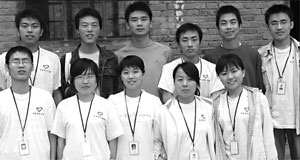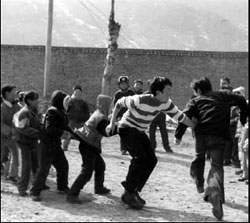'I have a dream'
Ma Yonghong (second left, top row), has a picture taken with several volunteers to his home village during the winter vocation. |
Despite this remarkable achievement the first university student, Ma has an even bigger dream.
Very unlike any ordinary 22-year-old student, Ma's dream is to do something worthwhile with his life and "make a difference". His primary concern is to help improve the living conditions of his fellow inhabitants back home in Hexing Village, Shaanxi Province.
It wasn't always like this for Ma. Back in 2003, he was delighted to find himself at university in Xi'an, "University life is supposed to be like a glass of mellow wine, so good that you want to savour it very slowly, sip by sip," Ma said.
'Lost' on campus
Ma Yonghong, plays a game with the children in his village. |
Ma was not only disillusioned by university life, he was also ill at ease with life in the city - he felt confused and lost. "Life in Xi'an has ruined many of the dreams I had of the city when I was living back home in my village," he wrote in his dairy.
In order to get rid of the "bad influences" of city life, and to maintain his purity, Ma started to donate blood, or what he called "changing blood". Ma believed that by donating his blood, he would wash away all of the evil or "bad influences" of the city and that the fresh blood would help keep him pure - over a four month period he donated more than 1,000ml of blood.
To some, his actions seemed bizarre. Yet, Professor Qian Liqun from Peking University said that Ma's actions were, "an experiment in finding a way to fill the absence of morality amongst contemporary college students."
"Ma's unwillingness to study on campus has exposed the problems that our universities have today," Qian said.
In November 2004, when blood donation failed to satisfy his passion to help the less fortunate, Ma joined a volunteer project that his department had organized to teach children in Lantian Village, Shaanxi.
The one-day experience of teaching in Lantian not only satisfied Ma, but also brought about a sense of enlightenment.
"The sense of achievement and recognition from the villagers was something I missed at university," Ma said, "teaching and working in rural areas is more worthwhile than sitting in the university classroom," he added.
After his return from his short excursion to Lantian, Ma began to organize several volunteer trips back home to Hexing Village. After a while, he finally decided to ask the university to grant him a one-year deferral so that he could stay in the village and coordinate the volunteer efforts.
Initially, his lecturers met his request with scepticism. Jiang Guogang, Ma's tutor at NUPL said he understood that Ma's intentions were good, but the university just didn't want him to work in the village and neglect his university studies.
Eventually however, Ma was able to persuade the university staff and finally get his wish, "Had we not agreed," said Jiang, "Ma would have been expelled as he stopped coming to class - we didn't want to see him drop out."
Election
disaster
On July 10, 2005 Ma returned to his village, marking the beginning of his one-year deferral from university. His first move was to run for election against the village head He Geng to the post of official of the village committee.
"The election was a golden opportunity for me," Ma said, "I believed I could use the power to help transform the village."
In order to ensure his eligibility to stand for election and, indeed cast a vote, Ma changed his household registration back to the village from his university in Xi'an.
Just when Ma was about ready for the election, the election committee announced the cancellation of his candidacy saying his "household registration was not qualified."
Angered by what had occurred, Ma decided to sue the Hexing Village Committee. Although he won the case, the election committee still did not list him as a candidate - the villagers had to write Ma's name on the ballot paper if they wanted to cast their vote for him.
Despite this unfortunate set of circumstances, Ma received 126 votes in the election, whilst incumbent He Gang got 148. As neither Ma nor He received more than half the total number of votes cast, a runoff election was decided upon.
On November 29, the second election took place - Ma was defeated by He Gang again and lost his opportunity to wield power. "I was quite disappointed," Ma said, "It's not what I had expected."
However, Wen Tiejun, China's prominent expert on rural development was amazed to hear of Ma's involvement in the election. "The purpose of organizing university students to work in rural areas is to help them get a better understanding of the countryside and to help farmers with their work," Wen said, "we absolutely oppose student's involvement in village committee elections," he added.
He Gang also weighed into the argument by criticizing Ma's decision to stand, noting, "Ma Yonghong is a good boy, but he's too simple-minded and he doesn't understand the complexities of village affairs."
Looking to deter students hoping to follow in Ma's footsteps by standing in future elections, Wen asserted, "We've always stressed that nobody should ever think that they alone can become the 'saviour of the countryside'. It will be a long time before the situation in the countryside changes and it will take the combined effort of the government and the farmers, not just one individual - it cannot be rushed."
'Making a difference'
In spite of the unfortunate outcome of the local election, Ma was determined to fulfil his dream and "make a difference" for the people of his village.
Ma, along with a group of volunteer students under his stewardship, set up some night schools in Hexing and its neighboring villages, equipping local farmers with agricultural knowledge, and teaching women how to read and write.
He also organized a farmer's association - essentially a cooperative - which could buy fertilizer and animal feed in large quantities and at low prices, thus saving local farmers a lot of money. More than half of the households in Ma's village became members of his association, paying a membership fee of just 20 yuan ($2.5) to enjoy its benefits.
However, after a year's work there, Ma admitted that his village changed very little. "Things are complicated in the village," he said, "I didn't have enough social resources to coordinate my work," he added.
Ma felt frustrated, he felt that he didn't have enough time to carry out all that he wanted to achieve, "I wish I could be split into five parts," he said, "one to take care of my university study, one to spend time on writing literature, one working in the village, one working in Xi'an and one to spend time with my girlfriend."
Helping local farmers increase their profits is all but a small part of Ma's ambitious plan. Ma is involved in a project called "New City Dwellers", run by the Xi'an Academy of Social Sciences and is aimed at improving the living and working conditions of migrant workers in the city.
"We intend to prepare migrant workers with legal knowledge and help protect their rights," he said.
At the same time, he plans to work with more universities to influence policy makers in education. He noticed that most of the village activities organized by universities were seen as nothing more than just outings for the students.
"Education policy makers need to be more pragmatic about the activities they arrange in the countryside."
Looking at the bigger picture, Ma wants to set up an organization that will bring together young Chinese who want to make a contribution to the development of rural China.
"Some people say I'm daydreaming," Ma said, "but you never know when dreams come true."
(China Daily 03/21/2007 page20)
















